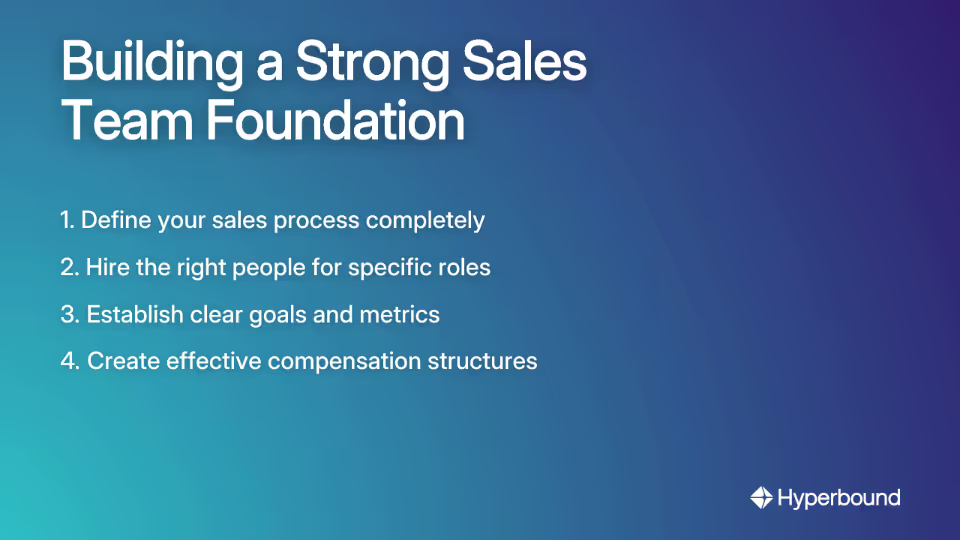
You've hired talented salespeople with impressive track records. You've invested in the best CRM system money can buy. Yet somehow, your team's performance remains stubbornly mediocre – quotas missed, deals lost, and worst of all, your best reps keep walking out the door.
The frustrating reality? Most sales leaders are thrown into management without the tools to develop their teams effectively. Companies expect managers to magically transform average performers into sales superstars, all while navigating the pressure of their own quotas and targets.
"My company provided zero development and training when I joined," shared one sales professional on Reddit. "I was basically told 'here's your territory, now go sell' with minimal guidance on how to actually succeed."
This guide tackles the critical missing piece in most sales organizations: a structured, data-driven sales coaching program that transforms individual contributors into an unstoppable revenue-generating team.
What is Sales Coaching? (And Why It's More Crucial Than Ever)
Sales coaching is an ongoing, interactive mentoring process designed to improve a salesperson's skills, mindset, and performance. Unlike traditional training which delivers information in a one-way flow, coaching creates a collaborative environment where reps develop the ability to succeed independently through targeted guidance and feedback.
According to Sendoso, effective sales coaching is "an interactive process aimed at helping individuals develop more rapidly and produce better results." It bridges the critical gap between knowing what to do and consistently executing in real-world scenarios.
Many sales leaders confuse coaching with training. Here's the key difference:
- Training teaches concepts and provides information
- Coaching reinforces concepts through practice, feedback, and real-world application
The ROI of Structured Coaching: Hard Data for Skeptics
If you're skeptical about investing time and resources into sales coaching (a common sentiment), consider these eye-opening statistics:
- Companies with a structured approach to coaching see a 10% increase in win rates, while informal coaching can actually harm results (according to RevenueGrid).
- Teams with formal coaching programs achieve 91% of quota compared to just 85% from informal approaches.
- Organizations with strong coaching cultures report 51% higher revenue than competitors (HCI research).
These aren't marginal improvements – they represent the difference between hitting ambitious growth targets and consistently falling short.

Why Coaching Matters Now More Than Ever
Today's sales environment is increasingly complex:
- Buying cycles are longer and less linear
- Multiple stakeholders influence purchase decisions
- Economic uncertainties create additional buyer hesitation
- Remote selling demands stronger communication skills
Effective sales coaching helps reps navigate these challenges by developing adaptability, enhancing communication skills, and improving their ability to articulate value throughout the customer journey.
The Foundation: Building a Team Worth Coaching
Before diving into coaching techniques, we need to address a fundamental truth: coaching is only effective when applied to the right foundation. As one entrepreneur on Reddit wisely noted, "you should not hire a sales team until you fully understand and can execute the sales process yourself."
Let's build that foundation step by step:

Step 1: Define Your Sales Process First
The cornerstone of any effective sales team is a clearly defined, buyer-aligned sales process. This isn't just about creating a flowchart – it's about documenting how your specific customers buy and how your team can best guide them through that journey.
Your sales process should be:
- Documented in detail with clear stages
- Embedded in your CRM to ensure consistency
- Aligned with how buyers actually purchase
- Measurable with specific metrics at each stage
CRM platform Nutshell recommends embedding your process directly into your CRM system to accelerate onboarding for new reps and create accountability for the entire team. For a deeper dive, seek out a comprehensive guide on building a sales process.
Step 2: Know Who to Hire & Define Clear Roles
Many sales organizations struggle because they haven't clearly defined team roles and responsibilities. Before expanding your team, assess your current capabilities to identify specific gaps.
Create a clear team structure with detailed job descriptions for each role:
- Sales Managers: Responsible for coaching, territory management, and team performance
- Account Executives: Focus on closing deals and managing customer relationships
- SDRs (Sales Development Representatives): Specialize in prospecting and qualifying leads
Detailed job descriptions not only clarify responsibilities but also attract the right talent. As Nutshell points out, "when you know exactly what you want someone to do, you can hire someone who's excited about doing those things."
Step 3: Establish Clear Goals, Metrics, and Compensation
Setting the right goals and metrics is crucial for effective coaching:
- Use the SMART framework to establish goals that are Specific, Measurable, Achievable, Relevant, and Time-bound.
- Track meaningful performance metrics beyond basic activity numbers, such as:
- Win rates by opportunity type
- Average sales cycle length
- Lead response time
- Deal size trends
A common pain point for entrepreneurs is finding quality reps willing to work on "commission only" arrangements. The reality? Commission-only structures typically attract desperate or inexperienced salespeople. Harvard Business Review research shows that multi-component compensation systems (base salary + commission + performance bonuses) typically drive better overall performance and retention.
The Sales Coaching Playbook: 13 Techniques for Unstoppable Performance

With your foundation in place, let's explore the most effective sales coaching techniques that transform average performers into sales champions.
The Process (Techniques 1-4)
1. Follow a Formal Process
Teams are 1.4 times more likely to succeed with a structured coaching process, according to Sendoso. This isn't just nice-to-have – it's essential. A formal coaching process ensures consistency, accountability, and measurable improvement over time.
2. Meet Regularly
Schedule consistent 1:1 coaching sessions with each team member. According to Sendoso, bi-weekly meetings provide the optimal balance between giving reps enough time to implement changes while maintaining momentum.
The key is consistency – sporadic coaching sessions signal to your team that development isn't actually a priority.
3. Use Good Data
Base your coaching on performance metrics from your CRM, not just gut feelings or casual observations. Analyze patterns in:
- Call recordings
- Email sequences
- Opportunity progression
- Win/loss rates
Data transforms coaching from subjective opinions into objective guidance based on actual performance patterns.
4. Take Meticulous Notes
Document your coaching sessions with detailed notes on:
- What was discussed
- Action items agreed upon
- Progress made since previous sessions
- Areas for continued focus
These notes create accountability and allow you to track improvement over time. Sendoso emphasizes that documentation demonstrates your commitment to the rep's development and ensures consistent follow-up.
The Methodology (Techniques 5-9)
5. Focus on ONE Thing at a Time
One of the most common coaching mistakes is overwhelming reps with too many improvement areas simultaneously. This leads to paralysis and frustration rather than improvement.
Instead, identify a single skill or behavior to improve and focus your coaching session exclusively on that. Sendoso advises that this focused approach leads to measurable improvement in specific areas rather than marginal improvements across many.
6. Ask for Self-Evaluation
Begin coaching sessions by asking the rep to evaluate their own performance. Questions like "How do you think that call went?" or "What would you do differently next time?" build self-awareness and ownership.
This approach also reveals gaps between how reps perceive their performance and reality, creating natural openings for coaching interventions.
7. Tailor Your Approach
Different situations require different coaching approaches. RevenueGrid recommends three distinct coaching types:
- Strategic Coaching: Helps reps with long-term planning and career development. The GROW model (Goals, Reality, Options, Way Forward) works well here.
- Tactical Coaching: Focuses on actionable steps for specific situations, like providing a script for using LinkedIn for prospecting.
- Skill Coaching: Develops fundamental capabilities through practice and repetition. This is where AI-powered tools provide a significant advantage. AI Sales Roleplays, for example, offer reps a safe space to get unlimited "at bats" with realistic buyer personas, mastering skills on their own time.
Matching your coaching style to the specific need dramatically increases effectiveness.
8. Build Trust by Being Human
Great coaches share personal stories of both failure and success. This vulnerability creates psychological safety, allowing reps to admit mistakes and seek help without fear of judgment.
"When I share how I completely bombed a major presentation early in my career, my reps feel comfortable discussing their own challenges," explains a sales leader quoted in Sendoso's research.
9. Coach the Middle
While it's tempting to focus coaching efforts on struggling performers or top stars, the biggest opportunity for overall team improvement often comes from coaching the middle 60-70% of your team.
According to RevenueGrid, a modest improvement in your middle performers creates a larger aggregate impact than significant improvement in a few bottom performers.
The Execution (Techniques 10-13)
10. Provide Actionable Training
Effective coaches share specific, experience-based strategies, not just theoretical concepts. This includes:
- Proven closing techniques tailored to your industry
- Effective discovery questioning frameworks
- Objection handling scripts that actually work
The key is providing practical tools reps can immediately apply in real sales situations.
11. Challenge Your Team
Growth happens outside comfort zones. Effective coaches push reps to stretch their capabilities by:
- Setting ambitious but achievable targets
- Encouraging new approaches to persistent challenges
- Creating friendly competition that drives performance
Sendoso notes that the most effective coaches balance support with appropriate challenge to foster resilience and growth.
12. Effectively Motivate
Understanding what motivates each individual rep is crucial for effective coaching. Some are driven primarily by financial incentives, while others value recognition, autonomy, or career advancement.
A personalized approach to motivation addresses both:
- Intrinsic motivators: Personal growth, purpose, mastery
- Extrinsic motivators: Financial rewards, recognition, advancement
Sales Assembly recommends using surveys and feedback sessions to understand what truly drives each team member.
13. Point to Further Resources
Great coaches connect reps with additional learning resources to supplement formal coaching:
- Industry-specific articles and research
- Books on sales methodology and mindset
- Podcasts featuring top performers
- Online courses (platforms like Udemy were specifically recommended in user research)
This approach encourages a culture of continuous learning beyond formal coaching sessions.
Advanced Strategies: Motivation, Compensation, and Culture
Building an unstoppable sales team requires going beyond basic coaching techniques to address the broader environment in which your team operates.
Motivation Beyond the Basics
Great sales coaches understand the interplay between intrinsic and extrinsic motivation:
- Intrinsic motivation comes from personal satisfaction, growth, and purpose
- Extrinsic motivation derives from external rewards like commission, recognition, and advancement
Sales Assembly emphasizes that effective motivation requires understanding each rep's unique drivers. Some are primarily motivated by cash incentives, while others may value public recognition or career advancement opportunities more highly.
The most effective approach is personalizing your motivational strategies based on individual preferences. Use surveys and one-on-one discussions to uncover what truly drives each team member, then tailor your approach accordingly.
Rethinking Compensation
Traditional sales compensation plans can sometimes backfire. Harvard Business Review research reveals several common pitfalls:
- Overly complex plans that reps struggle to understand
- "Ratcheting" quotas that increase based on past success, creating perverse incentives
- Commission caps that demotivate top performers once they hit the ceiling
One key recommendation stands out: Remove commission caps. Allowing unlimited earning potential is a powerful motivator for top performers and signals that exceptional results will be rewarded exceptionally.
The most effective compensation structures incorporate multiple components:
- Base salary for stability
- Commission for performance incentive
- Quarterly bonuses for short-term motivation
- Overachievement kickers for exceptional results
This multi-faceted approach motivates different personality types and performance levels on your team.
Building a Coaching Culture
Creating an unstoppable sales team goes beyond 1:1 coaching sessions. It requires fostering an environment where coaching and development are woven into the fabric of daily operations.
Key elements of a strong coaching culture include:
- Open communication where feedback flows freely
- Public recognition of achievements and improvements
- Peer-to-peer coaching that multiplies learning opportunities
- Work-life balance that prevents burnout and supports retention
Nutshell emphasizes that investing in your team's well-being and promoting sustainable performance is critical for long-term retention and results.
Equipping Your Team: The Best Sales Coaching Tools & Resources
Modern technology has transformed what's possible in sales coaching. The right tools can automate tedious tasks and provide data-driven insights, freeing up managers to focus on what they do best: coaching.
Recommended Software Solutions
While many tools can support a coaching program, AI-powered platforms have become game-changers for scaling data-driven coaching. These platforms analyze real conversations to identify winning behaviors and allow reps to practice in realistic, AI-powered roleplays. Leading solutions in this category include:
- Hyperbound: An advanced AI Sales Coaching platform that analyzes your team's winning behaviors to create hyper-realistic AI roleplays. It provides instant, objective feedback on both practice and real calls to reduce ramp time and scale effective coaching.
- Gong: A revenue intelligence platform that analyzes customer-facing interactions to provide insights.
- Second Nature: Provides AI-powered sales coaching simulations for practice.
- Mindtickle: A sales readiness platform that includes coaching and conversation intelligence features.
Beyond Software: Finding Human Mentorship
Many sales professionals express frustration with finding reliable mentors and networking opportunities. As one Reddit user lamented, "It's hard to identify who's a legitimate coach versus who's just a snake oil salesperson."
If you're looking for mentorship beyond your organization:
- Seek out top performers within your company as mentors
- Attend local networking events specifically for sales professionals
- Join industry-specific online communities and forums
- Consider building foundational skills first before investing in expensive coaching
It's worth noting that external coaching can range from $500 to $5,000 for public programs or $3,500 to $25,000 per day for private coaching, so ensuring you have a solid foundation first is critical.
From Sales Team to Sales Dynasty
Building an unstoppable sales team isn't about finding mythical "sales superstars" or implementing the latest trendy technique. It's about creating a structured, data-driven sales coaching program that consistently develops every team member's capabilities over time.
The path to sales excellence begins with a solid foundation:
- A defined process that guides consistent execution
- Clear roles that leverage individual strengths
- The right metrics that focus effort where it matters most
Effective coaching then builds on this foundation through:
- A consistent, formalized coaching process
- Personalized approaches that focus on one improvement area at a time
- A balance of support and challenge that drives growth
What separates good sales teams from truly great ones is the creation of a coaching culture where continuous improvement becomes the norm rather than the exception.
The investment in sales coaching isn't just worthwhile; it's essential. According to RAIN Group, great coaching can increase deal size, activity, win rates, and leads by 25%-40%.
Your challenge now? Take one technique from this guide and implement it in your next coaching session. The journey from struggling sales team to unstoppable revenue machine begins with that single step.
Frequently Asked Questions
What is the difference between sales coaching and sales training?
Sales training teaches concepts and provides information, while sales coaching reinforces those concepts through practice, feedback, and real-world application. Training is often a one-time event focused on knowledge transfer, whereas coaching is an ongoing, interactive process designed to build skills and change behaviors over time.
How often should I conduct sales coaching sessions?
You should conduct sales coaching sessions on a consistent schedule, with bi-weekly meetings being a highly effective frequency. This cadence gives reps enough time to apply feedback and demonstrate progress without losing momentum. The key is regularity and predictability, which shows your team that their development is a genuine priority.
How can I measure the ROI of my sales coaching program?
You can measure the ROI of your sales coaching by tracking improvements in key sales metrics. Before starting, benchmark your team's current performance on metrics like win rates, quota attainment, average sales cycle length, and deal size. After implementing a structured coaching program, monitor these same metrics to quantify the impact. Companies with formal coaching often achieve over 90% quota attainment.
What is the most important sales coaching technique for new managers?
The most important technique is to focus on one specific skill at a time for each rep. New managers often try to fix everything at once, which overwhelms the salesperson and hinders progress. By identifying a single, high-impact area for improvement—such as objection handling or discovery questions—you can provide targeted feedback that leads to measurable and lasting skill development.
Why is it important to coach the “middle” performers?
Coaching the middle 60-70% of your sales team provides the greatest opportunity for significant overall team improvement. While it's tempting to focus on top or bottom performers, a small improvement across this large middle group will generate a much larger aggregate lift in revenue and performance than a large improvement from a single struggling rep.
What should I do if a sales rep is resistant to coaching?
If a rep is resistant to coaching, the first step is to build trust by creating psychological safety. Start sessions by asking for their self-evaluation to empower them and give them ownership of the process. Share stories of your own past struggles to show vulnerability. Connect the coaching directly to their performance data and goals to demonstrate how it will help them succeed and earn more.
Can AI tools replace human sales coaches?
AI tools are designed to augment, not replace, human sales coaches. AI-powered platforms like Hyperbound can automate the analysis of sales calls and provide reps with unlimited, objective practice through AI roleplays. This scales the coaching process and frees up managers from repetitive tasks, allowing them to focus on high-level strategic guidance, motivation, and mentorship that only a human can provide.

Book a demo with Hyperbound
.png)













